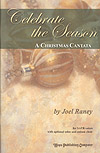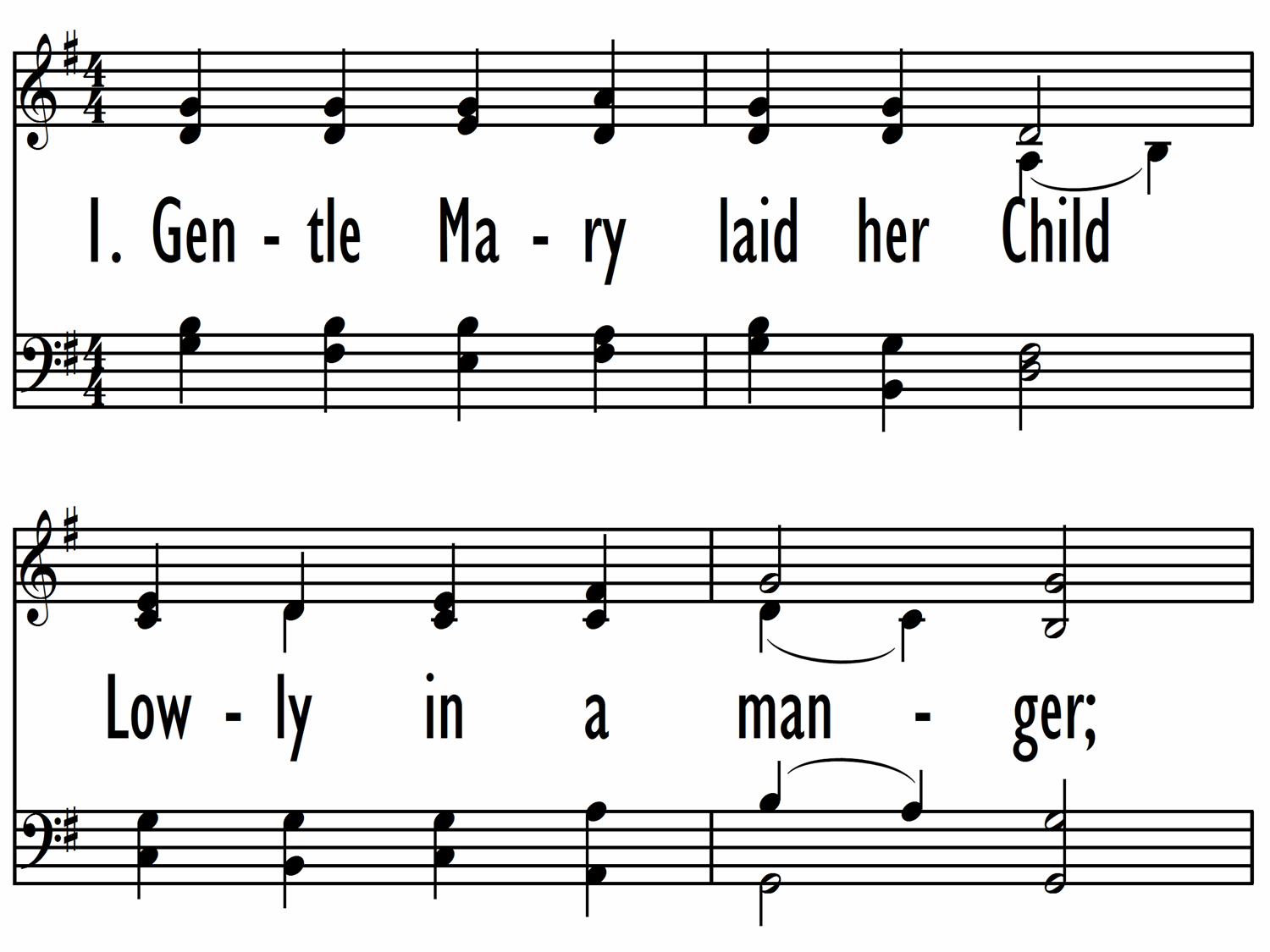- |
User Links
Gentle Mary Laid Her Child

Gentle Mary laid her child
Author: Joseph Simpson Cook (1919)Tune: TEMPUS ADEST FLORIDUM
Gospel Acclamation Songs
Published in 48 hymnals
Printable scores: PDFPlayable presentation: Lyrics only, lyrics + musicAudio files: MIDI, Recording
Representative Text
1 Gentle Mary laid her Child
Lowly in a manger;
There He lay, the undefiled,
To the world a stranger:
Such a Babe in such a place,
Can He be the Savior?
Ask the saved of all the race
Who have found His favor.
2 Angels sang about His birth;
Wise men sought and found Him;
Heaven's star shone brightly forth,
Glory all around Him:
Shepherds saw the wondrous sight,
Heard the angels singing;
All the plains were lit that night,
All the hills were ringing.
3 Gentle Mary laid her Child
Lowly in a manger;
He is still the undefiled,
But no more a stranger:
Son of God, of humble birth,
Beautiful the story;
Praise His name in all the earth,
Hail the King of glory!
Baptist Hymnal,, 1991
Author: Joseph Simpson Cook
Cook, Joseph Simpson. (Durham County, England, December 4, 1859--May 27, 1933, Toronto, Canada). Methodist. Wesleyan Theological College (Montreal) certificate, 1885; B.D., 1893; Illinois Wesleyan University, M.A., 1892; S.T.D., 1903. Pastorates in Ontario at Bayfield (1881-1882); Bluevale (1885-1887); Hensall (1888-1890); Ripley (1891-1893); Granton (1894-1896); Walkerville (1896-1898); Wallaceburg (1899-1902); Clinton (1903-1904); Ridgetown (1905-1908); Toronto (1909-1913, 1919-1925); Meaford (1914-1916); and Gravenhurst (1917-1918). He contributed articles and verse to many church-connected magazines. His best-known hymn, "Gentle Mary laid her child Lowly in a manger" won a 1919 contest of the Methodist weekly Christian Guardian. --Hu… Go to person page >Text Information
Related Texts
| First Line: | Gentle Mary laid her child |
| Title: | Gentle Mary Laid Her Child |
| Author: | Joseph Simpson Cook (1919) |
| Meter: | 7.6.7.6 D |
| Language: | English |
| Liturgical Use: | Gospel Acclamation Songs |
English
- Baptist Hymnal 1956 #73
- Baptist Hymnal 1991 #101
- Baptist Hymnal 2008 #212
- Celebrating Grace Hymnal #114
- Christian Worship (1993): a Lutheran hymnal #56
- Glory to God: the Presbyterian Hymnal #146
- Great Songs of the Church (Revised) #196
- Hymnal for Christian Worship #d79
- Hymns for a Pilgrim People: a congregational hymnal #96
- Hymns for the Living Church #107 10 shown out of 34
Korean
Latin
For Leaders
Text:
“Gentle Mary Laid Her Child” was written by Joseph Simpson Cook in 1919. One writer reports that it “was written in 1919 for a carol competition sponsored by the Christian Guardian and was first published in the Christmas issue of the magazine by the Methodist Publishing House, Toronto” (Fred D. Gealy, Companion to the Hymnal, p. 185). The first and third stanzas share the same structure and similar wording as they bracket the second stanza, which describes a high point of the Christmas story.
Tune:
The tune TEMPUS ADEST FLORIDUM is named after its original Latin text, which was loosely translated into English as “Spring has now unwrapped the flowers.” It was originally a spring carol, but is better known with the Christmas carol “Good King Wenceslas.” The source of this tune is the 1582 collection Piae Cantiones.
When/Why/How:
This hymn is sung in Christmas services. It could be paired with another hymn about the angels' visit to the shepherds, such as “Angels From the Realms of Glory” or “While Shepherds Watched Their Flocks.”
Hal Hopson's setting of “Gentle Mary Laid Her Child” for choir and keyboard fits the simplicity of the tune, and includes optional instruments (string quartet, handbells). Especially effective is the second verse, which is about the angels visiting the shepherds, where the lower voices sing the angels' song in Latin, “Gloria in excelsis Deo,” underneath the melody in the soprano. Gilbert Martin has set the text of “Gentle Mary” to an original melody in his choral arrangement. Instrumental arrangements that could be used for a prelude or special music include “Good King Wencesles”, a handbell arrangement of the tune by Martha Lynn Thompson with a full sound, and “A Carol Suite” by Michael Burkhardt, which includes a setting of this tune for organ and clarinet or oboe, and flute.
Tiffany Shomsky, Hymnary.org
Timeline
Arrangements
Media
- MIDI file from Baptist Hymnal 1991 #101
- Audio recording from Baptist Hymnal 1991 #101
- Audio recording from The Christian Life Hymnal #109
- MIDI file from The Cyber Hymnal #1731
- Audio recording from Glory to God: the Presbyterian Hymnal #146
- Audio recording from Lutheran Service Book #374
- Audio recording from Trinity Hymnal (Rev. ed.) #229


 My Starred Hymns
My Starred Hymns








